

Intelligence Definitions. Intelligence is most widely studied in humans, but has also been observed in non-human animals and in plants.
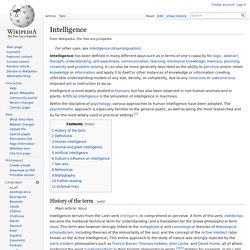
Artificial intelligence is the simulation of intelligence in machines. Within the discipline of psychology, various approaches to human intelligence have been adopted. The psychometric approach is especially familiar to the general public, as well as being the most researched and by far the most widely used in practical settings.[1] §History of the term[edit] Intelligence derives from the Latin verb intelligere, to comprehend or perceive. §Definitions[edit] 1. Abstract thought. Abstraction is a process by which concepts are derived from the usage and classification of literal ("real" or "concrete") concepts, first principles, or other methods.
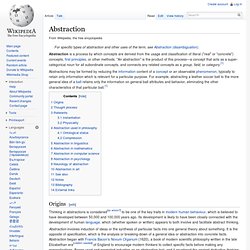
"An abstraction" is the product of this process—a concept that acts as a super-categorical noun for all subordinate concepts, and connects any related concepts as a group, field, or category.[1] Abstractions may be formed by reducing the information content of a concept or an observable phenomenon, typically to retain only information which is relevant for a particular purpose. For example, abstracting a leather soccer ball to the more general idea of a ball retains only the information on general ball attributes and behavior, eliminating the other characteristics of that particular ball.[1] Origins[edit] Thinking in abstractions is considered[by whom?] Abstraction involves induction of ideas or the synthesis of particular facts into one general theory about something.
Thought process[edit] Cat on Mat (picture 1) 2. Understanding. Understanding (also called intellection) is a psychological process related to an abstract or physical object, such as a person, situation, or message whereby one is able to think about it and use concepts to deal adequately with that object.
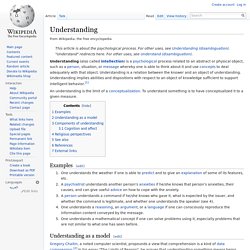
Understanding is a relation between the knower and an object of understanding. Understanding implies abilities and dispositions with respect to an object of knowledge sufficient to support intelligent behavior.[1] An understanding is the limit of a conceptualization. To understand something is to have conceptualized it to a given measure. Examples[edit] Understanding as a model[edit] Gregory Chaitin, a noted computer scientist, propounds a view that comprehension is a kind of data compression.[2] In his essay "The Limits of Reason", he argues that understanding something means being able to figure out a simple set of rules that explains it. 3. Self-awareness. Self-awareness is the capacity for introspection and the ability to recognize oneself as an individual separate from the environment and other individuals.[1] It is not to be confused with consciousness.

While consciousness is being aware of one’s environment and body and lifestyle, self-awareness is the recognition of that consciousness.[2] Neurobiological basis[edit] There are questions regarding what part of the brain allows us to be self-aware and how we are biologically programmed to be self- aware. V.S. Ramachandran has speculated that mirror neurons may provide the neurological basis of human self-awareness.[3] In an essay written for the Edge Foundation in 2009 Ramachandran gave the following explanation of his theory: "... Animals[edit] Studies have been done mainly on primates to test if self-awareness is present. 4. Communication. In the realm of biology in general, communication often occurs through visual, auditory, or biochemical means.
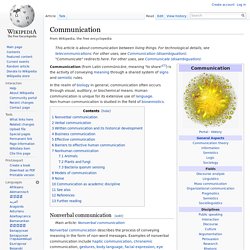
Human communication is unique for its extensive use of language. 5. Reasoning. Psychologists and cognitive scientists have attempted to study and explain how people reason, e.g. which cognitive and neural processes are engaged, and how cultural factors affect the inferences that people draw.
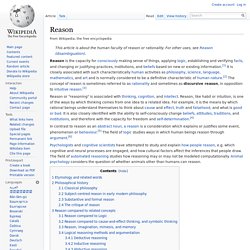
The field of automated reasoning studies how reasoning may or may not be modeled computationally. Animal psychology considers the question of whether animals other than humans can reason. Etymology and related words[edit] In the English language and other modern European languages, "reason", and related words, represent words which have always been used to translate Latin and classical Greek terms in the sense of their philosophical usage. The original Greek term was "λόγος" logos, the root of the modern English word "logic" but also a word which could mean for example "speech" or "explanation" or an "account" (of money handled).[7]As a philosophical term logos was translated in its non-linguistic senses in Latin as ratio.
6. Learning. Play has been approached by several theorists as the first form of learning.
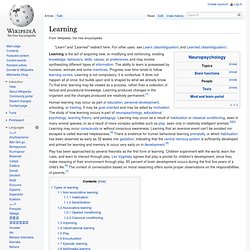
Children experiment with the world, learn the rules, and learn to interact through play. Lev Vygotsky agrees that play is pivotal for children's development, since they make meaning of their environment through play. 85 percent of brain development occurs during the first five years of a child's life.[6] The context of conversation based on moral reasoning offers some proper observations on the responsibilities of parents.[7] 7. Emotion. The physiology of emotion is closely linked to arousal of the nervous system with various states and strengths of arousal relating, apparently, to particular emotions. Emotions are a complex state of feeling that results in physical and psychological changes that influence our behaviour.
Those acting primarily on emotion may seem as if they are not thinking, but cognition is an important aspect of emotion, particularly the interpretation of events. For example, the experience of fear usually occurs in response to a threat. The cognition of danger and subsequent arousal of the nervous system (e.g. rapid heartbeat and breathing, sweating, muscle tension) is an integral component to the subsequent interpretation and labeling of that arousal as an emotional state. Emotion is also linked to behavioral tendency. 7. Memory. Overview of the forms and functions of memory in the sciences In psychology, memory is the process in which information is encoded, stored, and retrieved.
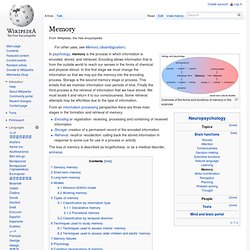
Encoding allows information that is from the outside world to reach our senses in the forms of chemical and physical stimuli. In this first stage we must change the information so that we may put the memory into the encoding process. Storage is the second memory stage or process. This entails that we maintain information over periods of time.
From an information processing perspective there are three main stages in the formation and retrieval of memory: 8. Problem solving. Problem solving consists of using generic or ad hoc methods, in an orderly manner, for finding solutions to problems. Some of the problem-solving techniques developed and used in artificial intelligence, computer science, engineering, mathematics, medicine, etc. are related to mental problem-solving techniques studied in psychology. Definition[edit] The term problem-solving is used in many disciplines, sometimes with different perspectives, and often with different terminologies. For instance, it is a mental process in psychology and a computerized process in computer science.
Problems can also be classified into two different types (ill-defined and well-defined) from which appropriate solutions are to be made. 9. Plan. Plans can be formal or informal: Structured and formal plans, used by multiple people, are more likely to occur in projects, diplomacy, careers, economic development, military campaigns, combat, sports, games, or in the conduct of other business.

In most cases, the absence of a well-laid plan can have adverse effects: for example, a non-robust project plan can cost the organization time and money.[1][2]Informal or ad hoc plans are created by individuals in all of their pursuits. The most popular ways to describe plans are by their breadth, time frame, and specificity; however, these planning classifications are not independent of one another. For instance, there is a close relationship between the short- and long-term categories and the strategic and operational categories.